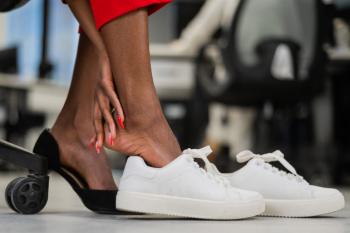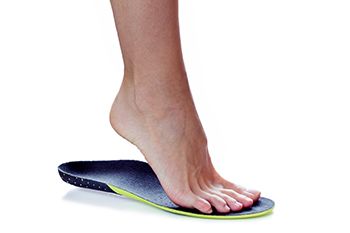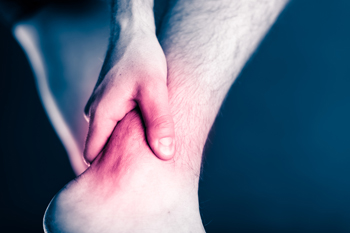
Rain or shine, snow or sleet, Custom Orthotics have your feet covered! As the seasons change, ensure your steps remain comfortable and supported. Custom Orthotics adapt to your footwear, from summer sandals to winter boots, providing consistent relief and alignment. Don't let the changing weather dictate your foot comfort. Step confidently year-round and experience the difference with Custom Orthotics. Call today for more information.

Heel pain affects many people due to the daily strain placed on their feet. While often attributed to heel spurs, the primary culprit is usually plantar fasciitis. Neglecting the intricate network of muscles in the feet can negatively affect any existing issues or cause new ones. Engaging in foot exercises to restore muscle length and enhance overall body balance can significantly alleviate heel pain. Also, the choice of footwear plays a pivotal role in foot health. Wearing worn out or unsupportive shoes can disrupt natural foot mechanics, leading to discomfort and potential injury. Regularly inspecting footwear, especially those used for physical activity, may help to decrease the risk of heel pain. Opt for shoes that provide adequate cushioning, support, and stability that helps maintain proper foot alignment. When heel pain persists despite these measures, seeking professional guidance from a podiatrist is imperative. This type of doctor can conduct a thorough evaluation to identify the root cause of the discomfort and develop a personalized treatment plan. Custom orthotics may be prescribed as a way to regain comfort and mobility. It is suggested that you schedule an appointment with a podiatrist to manage heel pain.
Many people suffer from bouts of heel pain. For more information, contact one of our podiatrists of Premier Ankle & Foot Specialists. Our doctors can provide the care you need to keep you pain-free and on your feet.
Causes of Heel Pain
Heel pain is often associated with plantar fasciitis. The plantar fascia is a band of tissues that extends along the bottom of the foot. A rip or tear in this ligament can cause inflammation of the tissue.
Achilles tendonitis is another cause of heel pain. Inflammation of the Achilles tendon will cause pain from fractures and muscle tearing. Lack of flexibility is also another symptom.
Heel spurs are another cause of pain. When the tissues of the plantar fascia undergo a great deal of stress, it can lead to ligament separation from the heel bone, causing heel spurs.
Why Might Heel Pain Occur?
- Wearing ill-fitting shoes
- Wearing non-supportive shoes
- Weight change
- Excessive running
Treatments
Heel pain should be treated as soon as possible for immediate results. Keeping your feet in a stress-free environment will help. If you suffer from Achilles tendonitis or plantar fasciitis, applying ice will reduce the swelling. Stretching before an exercise like running will help the muscles. Using all these tips will help make heel pain a condition of the past.
If you have any questions please contact our offices located in South York, West York, and East York, PA . We offer the newest diagnostic and treatment technologies for all your foot and ankle needs.

Foot orthotics are invaluable tools in addressing a range of foot and lower limb issues, from soft tissue injuries to neurological changes and bony injuries. These custom shoe inserts provide support, stability, and alignment, aiding in the rehabilitation and prevention of various conditions. For soft tissue injuries like plantar fasciitis, orthotics can alleviate strain by redistributing pressure and providing cushioning. In cases of bone injury such as stress fractures, orthotics can offer support and minimize excessive motion that could exacerbate the injury. Additionally, for individuals experiencing neurological changes like drop foot, orthotics can assist in maintaining proper foot position and facilitating a more natural gait pattern. The decision on the type of orthotic needed involves a thorough assessment of the individual's impairments, functional goals, and injury protection requirements. Factors such as foot structure, biomechanics, activity level, and footwear preferences are considered to tailor orthotics specifically to the individual's needs, ensuring optimal support and rehabilitation. If you have persistent foot problems or injuries, it is suggested that you make an appointment with a podiatrist to see if custom-made orthotics can help you.
The benefits of custom orthotics are far-reaching and can make a significant impact on your daily life. Whether you are an athlete looking to enhance your performance, a healthcare worker on your feet every day, someone who experiences chronic foot pain, or someone who wants to improve their overall comfort and well-being, custom orthotics can be a game changer.
Custom orthotics provide support, stability, and relief for a variety of foot conditions ranging from flat feet to heel pain. They can even help prevent injuries and address more severe foot concerns, such as plantar fasciitis and diabetic foot issues.
Contact one of our podiatrists at Premier Ankle & Foot Specialists to create tailored orthotics for you and enjoy a higher quality of life, reduced pain, and increased mobility. With the right orthotics, you can continue doing the things you love, whether it’s running, dancing, or simply walking comfortably without discomfort.
If you are suffering from foot discomfort or have concerns about your foot health, do not hesitate to contact one of our podiatrists at Premier Ankle & Foot Specialists to explore the benefits of orthotics for you. Your feet are the foundation of your body and investing in their well-being can lead to a happier, healthier, and more active lifestyle. Your feet will thank you!
If you have any questions please contact our offices located in South York, West York, and East York, PA . We offer the newest diagnostic and treatment technologies for all your foot and ankle needs.

Treatment for Achilles tendon pain involves a comprehensive approach to alleviate discomfort and promote healing. Short-term use of non-steroidal anti-inflammatory drugs, NSAIDs, under medical supervision can provide relief from Achilles tendon pain. Incorporating warm-up exercises, stretching, and resistance training to strengthen the lower leg muscles and improve tendon function may be prescribed. Orthotic devices such as shoe inserts can help to redistribute pressure away from the Achilles tendon and facilitate healing. Surgical intervention is reserved for cases where conservative treatments have failed, involving procedures such as tendon removal or reattachment. For a personalized treatment plan to treat Achilles tendon pain, it is suggested that you schedule an appointment with a podiatrist.
Achilles tendon injuries need immediate attention to avoid future complications. If you have any concerns, contact one of our podiatrists of Premier Ankle & Foot Specialists. Our doctors can provide the care you need to keep you pain-free and on your feet.
What Is the Achilles Tendon?
The Achilles tendon is a tendon that connects the lower leg muscles and calf to the heel of the foot. It is the strongest tendon in the human body and is essential for making movement possible. Because this tendon is such an integral part of the body, any injuries to it can create immense difficulties and should immediately be presented to a doctor.
What Are the Symptoms of an Achilles Tendon Injury?
There are various types of injuries that can affect the Achilles tendon. The two most common injuries are Achilles tendinitis and ruptures of the tendon.
Achilles Tendinitis Symptoms
- Inflammation
- Dull to severe pain
- Increased blood flow to the tendon
- Thickening of the tendon
Rupture Symptoms
- Extreme pain and swelling in the foot
- Total immobility
Treatment and Prevention
Achilles tendon injuries are diagnosed by a thorough physical evaluation, which can include an MRI. Treatment involves rest, physical therapy, and in some cases, surgery. However, various preventative measures can be taken to avoid these injuries, such as:
- Thorough stretching of the tendon before and after exercise
- Strengthening exercises like calf raises, squats, leg curls, leg extensions, leg raises, lunges, and leg presses
If you have any questions please feel free to contact our offices located in South York, West York, and East York, PA . We offer the newest diagnostic tools and technology to treat your foot and ankle needs.
